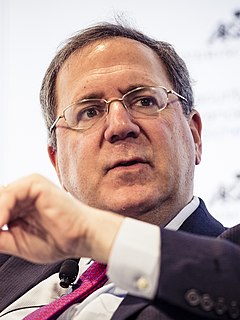A Quote by Robert C. O'Brien
The world has grown increasingly dangerous, with a nuclear madman in North Korea testing an ICBM a month, mullahs in Tehran plotting the takeover of the Middle East, Russia engaging in 'frozen conflicts' in Ukraine, Georgia, and Moldova, a very hot civil war in Syria, and China appropriating a vast swath of the Pacific to itself.
Related Quotes
It's no surprise that hackers working for North Korea, Iran's mullahs, Vladimir V. Putin in Russia, and the People's Liberation Army of China have all learned that the great advantage of cyberweapons is that they are the opposite of a nuke: hard to detect, easy to deny, and increasingly finely targeted.
I talk with countries, whether it's the Arab states or in the Middle East, and they talk about how they're glad to see us fighting against Iran. I talk with different countries in reference to Syria, and we talk about how we can get the Iranian influence out. We're talking about North Korea and what we need to do and the pressure we need to put on China. They're happy that we're finally beating up on Russia for what they've done in the Ukraine.
China is ruthlessly pragmatic. It supports North Korea for its own selfish interests. And I believe that China no longer considers us an ally. The current president, Xi Jinping, cultivates close relations with South Korea. He has never met with me, the leader of North Korea, something that the leader of China has always done. At the grand celebrations in Beijing two years ago commemorating the 70th anniversary of the end of World War II, he placed the president of Russia and the president of South Korea at his side. In North Korea, we pay a lot of attention to ceremonies and what they signal.
The Iranian issue I don't think has much to do with nuclear weapons frankly. Nobody is saying Iran should have nuclear weapons nor should anybody else. But the point in the Middle East, as distinct from North Korea, is that this is center of the world's energy resources. Originally the British and secondarily the French had dominated it, but after the Second World War, it's been a U.S. preserve. That's been an axiom of U.S. foreign policy, that it must control Middle East energy resources.
Much as Cold War nuclear strategists could argue about winning a nuclear war by having more survivors, advocates of a Global Warming War might see the United States, Western Europe, or Russia as better able to ride out climate disruption and manipulation than, say, China or the countries of the Middle East.
It seems not to matter that we are at the brink of a war that may spread beyond Afghanistan and Iraq to Iran and Georgia and then where? To Syria? To North Korea? To China? That we in America are in economic doldrums and are seeing small businesses fold and houses reclaimed by banks and a smouldering panic that is palpable everywhere.
The message that we must send to North Korea is twofold: If the North Korean regime believes that it can defend and protect itself through nuclear and missile programs, that is a misjudgment. But if North Korea gives up its nuclear program, we will help it secure and develop itself. We must consistently send these two messages.
I worry very, very much about an isolated country. That's what makes me nervous. Russia lives in the world. China lives in the world. North Korea is a very, very strange country because it is so isolated, and I do feel that a nation with nuclear weapons, they have got to be dealt with. Dealt with effectively.
The North Korean regime remains one of the world's leading proliferator of missile technology, including transfers to Iran and Syria. The transfer of nuclear weapons or material by North Korea to states or non-state entities would be considered a grave threat to the United States, and we would hold North Korea fully accountable of the consequences of such action.
North Korea and China have proposed what sounds like a pretty sensible option that North Korea should end its development of nuclear weapons, the US should stop carrying out hostile military maneuvers on the North Korean border. The US immediately rejected it. Modernization program is a very clear example of how security doesn't matter. There is no gain in security but massive overkill of the adversary's deterrent capacity. The only consequence of it is to elicit the likelihood of a preemptive attack. And a preemptive attack leads to a nuclear winter world.
If we had a relationship with Russia, that would be a good thing. In fact, it would be a great thing, not a bad thing. Because Vladimir Putin could really help us in North Korea. We have a big problem with North Korea. And China is helping us. And because of the lack of a relationship that we have with Russia because of this artificial thing that's happening with this Democratic-inspired thing, we could really be helped a lot, tremendously, with Russia having to do with North Korea.


































